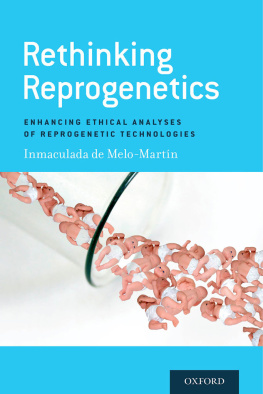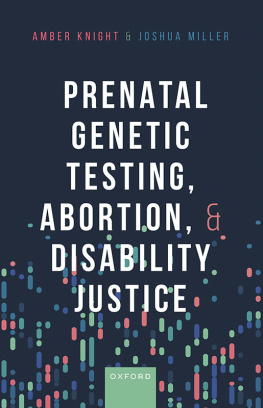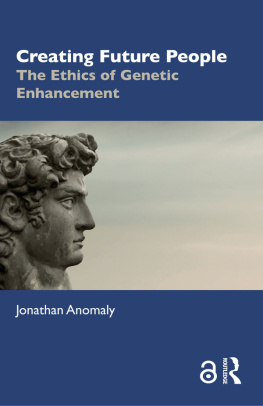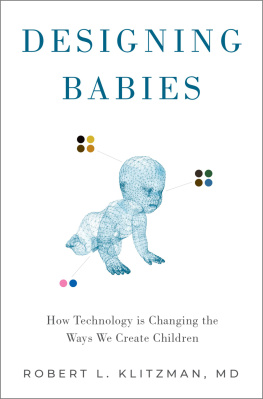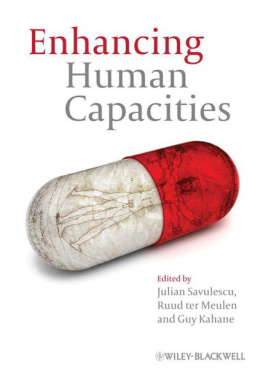RETHINKING REPROGENETICS
Rethinking Reprogenetics
Enhancing Ethical Analyses of Reprogenetic Technologies
Inmaculada de Melo- Martn


Oxford University Press is a department of the University of Oxford. It furthers the Universitys objective of excellence in research, scholarship, and education by publishing worldwide. Oxford is a registered trade mark of Oxford University Press in the UK and certain other countries.
Published in the United States of America by Oxford University Press
198 Madison Avenue, New York, NY 10016, United States of America.
Oxford University Press 2017
All rights reserved. No part of this publication may be reproduced, stored in a retrieval system, or transmitted, in any form or by any means, without the prior permission in writing of Oxford University Press, or as expressly permitted by law, by license, or under terms agreed with the appropriate reproduction rights organization. Inquiries concerning reproduction outside the scope of the above should be sent to the Rights Department, Oxford University Press, at the address above.
You must not circulate this work in any other form and you must impose this same condition on any acquirer.
Library of Congress Cataloging-in-Publication Data
Names: de Melo-Martn, Inmaculada, author.
Title: Rethinking reprogenetics : enhancing ethical analyses of reprogenetic technologies / by Inmaculada de Melo-Martn.
Description: Oxford ; New York : Oxford University Press, [2017] | Includes bibliographical references.
Identifiers: LCCN 2016013522| ISBN 9780190460204 (hardcover : alk. paper) | ISBN 9780190460228 (epub) | ISBN 9780190460211 (updf)
Subjects: | MESH: Reproductive Techniques, Assistedethics | Genetic Enhancementethics
Classification: LCC RG133.5 | NLM WQ 208 | DDC 176/.2dc23 LC record available at http://lccn.loc.gov/2016013522
For Cristina, she is so much like her mom, her dad, and her brother
CONTENTS
This book has benefited from the comments of friends and colleagues. Thanks are due to Stephen Brown, Ina Cholst, Sharon Crasnow, Malia Fullerton, Anita Ho, Kristen Intemann, Mary Mahowald, Laura Purdy, and Arleen Salles for their helpful suggestions and criticisms.
Much of this work was done during my 2015 sabbatical leave. I am thankful to Weill Cornell Medical College for sabbatical funding and to my Division Chief, Joseph Fins, for his support. Thanks also to Zev Rosenwaks and Ron MacKenzie for their continuing support of my work. Part of my sabbatical leave was spent at the University of Washington. I am grateful to the UW Philosophy Department for inviting me to be the Benjamin Rabinowitz Visiting Professor in Medical Ethics. It was while I was there that this project took final shape. I am particularly grateful to Sara Goering, Michael Rosenthal, and Alison Wylie for all their help during my stay. Thanks are also due to the students in my class, Ethical Issues in Reproductive and Genetic Technologies. Our discussions helped me clarify many of the arguments that appear in this book.
I am similarly indebted to Stephen Brown for pushing me to write this book and for offering me the spaceliterally and figurativelyto write a significant part of it. Thanks also to Lucy Randall, my editor at OUP, for her encouragement and support through all the stages of this project.
As always, I am grateful to and for my family and friends. They provide the love, support, wine-tasting trips, laughs, interesting conversations, and encouragement that make my work enjoyable, and their presenceeven when they are absentreminds me how lucky I am. Thanks to my nephew Martin and my niece Cristina for highlighting the value of what is unchosen.
draws on Sex Selection and the Procreative Liberty Framework, which appeared in 2013 in the Kennedy Institute Ethics Journal 23 (1):118. Thanks to the Johns Hopkins University Press for permission to use this material.
born through these technologies will have DNA content from three different individuals rather than the usual two. These are but some of the ways in which reprogenetic technologies are now being used and could be used in the future.
Why should we care about reprogenetic technologies? To be sure, these technologies, which combine the power of reproductive technologies with the tools of genetic science, are fascinating in many ways. They can provide newsworthy story lines about three-parent babies (). Overall, however, the rates are relatively low. Similarly, whereas the use of reprogenetic technologies to create and screen embryos for a variety of mutations related to disease or disability or to select embryos of a preferred sex is now relatively routine, their use to create perfect babies, or to enhance certain characteristics such as intelligence, strength, beauty, longevity, or self-control, is at present speculative.
It is true that many possible uses of reprogenetics are merely theoretical and that those that are not have a limited impact at ). These advances thus present us with important ethical challenges. Even if one sets aside concerns about the possible use of reprogenetic technologies to radically overhaul our species, there are good reasons to believe that they can have profound effects on women, people with disabilities, and society in general. It is hardly surprising that they have received a significant amount of attention from the public, the general media, national and international policy-making bodies, and scholars from a variety of disciplines.
Mainstream proponents of reprogenetics believe that the transformative effects of these technologies, both current and future, are positive and should be welcomed. They argue that they increase reproductive choice, contribute to a reduction of suffering by eliminating genetic diseases and disabilities, and offer the opportunity to improve the human condition. Many also embrace these technologies for their potential ability to create beings who will have longer and healthier lives, better intellectual capacities, and more refined emotional experiences. Indeed, proponents often deem these technologies to be of such significance to human well-being that they take the raising of any concerns about reprogenetics as an obstacle to human progress. Some of the most vocal supporters, such as John Harris and Julian Savulescu, contend that the implementation of these technologies to select and enhance our offspring is such a benefit to humankind that it is not only morally permissible but morally required.
It is often difficult to decide how to respond to such enthusiastic and, as I will argue, usually simplistic appraisals of these technological interventions. When technologies affect central aspects of human existence such as reproduction and health, attempting to temper the fervor by calling attention to the various concerns that the technologies raise risks accusations of irrationality, obstructionism, Luddism, social conservatism, religious zealotry, and the like. Witness, for instance, the debate over the use of reprogenetic technologies to select embryos of the desired sex. Critics of this practice are accused not only of illegitimately interfering with peoples reproductive liberties but also of being mystical, incoherent, and irrational (Harris 2005). Unsurprisingly, those who are less sanguine about these biomedical technologies are forced to be on the defensive, often feeling the need to preface their less enthusiasticor completely disapprovingviews by assuring the audience that they are not against scientific and technological development.

